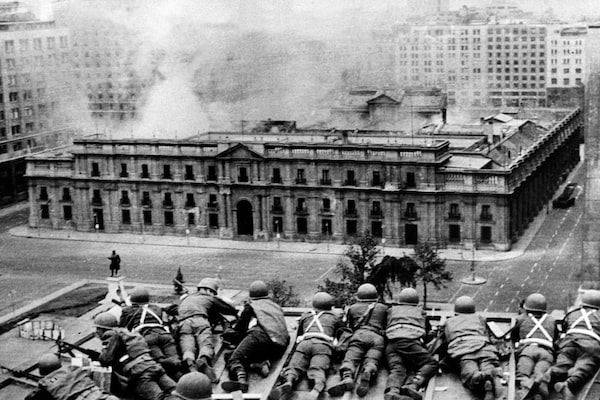
Chilean Army troops positioned during the military coup led by General Augusto Pinochet which overthrew Chilean constitutional president Salvador Allende, who died in the palace during the attack on Sept. 11, 1973.-/AFP/Getty Images
John M. Kirk is professor emeritus of Latin American studies at Dalhousie University and the author/co-editor of 22 books on Latin America.
Sept. 11 marks the 50th anniversary of the 1973 military coup in Chile, when the democratically elected government of then-president Salvador Allende was overthrown by General Augusto Pinochet. I had arrived in Vancouver the day before, ready to start a doctorate in Latin American Studies at the University of British Columbia. After the coup, scores of refugees arrived in Canada, and I was involved in community programs to assist them both in B.C. and later in Halifax, where I taught at Dalhousie University for 43 years.
I was ill-prepared for the challenges involved in refugee assistance.
Some background is pertinent. After the military coup, approximately 3,000 people were killed, over 1,200 “disappeared” (and are presumed to have been executed), 40,000 people were tortured, and between 200,000 and 400,000 were driven to exile. Scores of babies born while their mothers were in captivity were taken and given to supporters of the military junta.
In Vancouver and Halifax, I worked with a coalition of groups to help the waves of recently arrived refugees adapt to life in their new country. As an interpreter, I helped well-meaning psychiatrists and social workers in their efforts to help refugees settle in Canada. Despite the best of intentions, they were often unable to really comprehend the suffering experienced by their clients.
Most of these Canadian professionals had no experience working with victims of torture. One can read all of the gruesome accounts found in the annual reports from Amnesty International and Human Rights Watch, but nothing prepares you for sitting with actual victims and hearing them recount the painful details of their horrific experiences.
Electric shocks to the genitals and nipples, waterboarding (a method later made infamous by the Guantanamo Bay detention centre), sexual abuse, and forcing prisoners’ heads into buckets of excrement were common forms of torture in Chile after the coup. The “grill” was also used – with victims being electrocuted while strapped down on a metal bed frame. Women were singled out for sexual abuse. Rape was common, but women were also subjected to other horrific acts of sexual violence, including acts involving animals, as their captors sought to humiliate them and break their spirits.
Psychological torture was commonplace, with threats being made against captives’ families. In Halifax, I worked with one Allende supporter who had been arrested, beaten with unusual ferocity (since he had been a soldier who had resisted the military coup), and then informed that he would be executed. On the day before the assigned execution, he was told to prepare himself mentally. He wrote letters to his family and was visited by a priest to hear his last confession.
The following day, he was led out by the execution squad, placed against a wall, and had a hood placed over his head. He heard the instructions being given to the firing squad, and braced himself for the inevitable. But then, the soldier in charge of the squad came to him, removed the hood, and told him that he had been given some extra time to reflect on the meaning of life. The impact of this psychological torture continues to haunt him.
In the early 1990s, I went to Chile on a research project. While there, I met with Cardinal Raúl Silva Henríquez, who was then the head of the Catholic Church in the country, as well as several religious workers at the Vicaría de la Solidaridad. Cardinal Henríquez had set up the Vicaría to provide support for those seeking protection of their human rights – much to the frustration of General Pinochet. From them, I heard first-hand accounts of the scores of victims of the dictatorship who had sought protection from the Church, and others who had come to the Vicaría desperately seeking news about “disappeared” family members.
There is much to say about the military coup of 1973 in Chile. The overthrow of a democratically elected government by the military should remind us of such dangers. U.S. involvement (and in particular, the roles of Henry Kissinger and Richard Nixon, who were active supporters of the coup) needs to be remembered, and condemned. The inhumanity of war continues, as vicious as ever.
Winston Churchill is said to have repeated the adage that “History is written by the victors.” On the 50th anniversary of the coup in Chile, it is important to offer a reminder that the military victors of 1973 are to be condemned, not celebrated – and that Churchill was only partially correct.